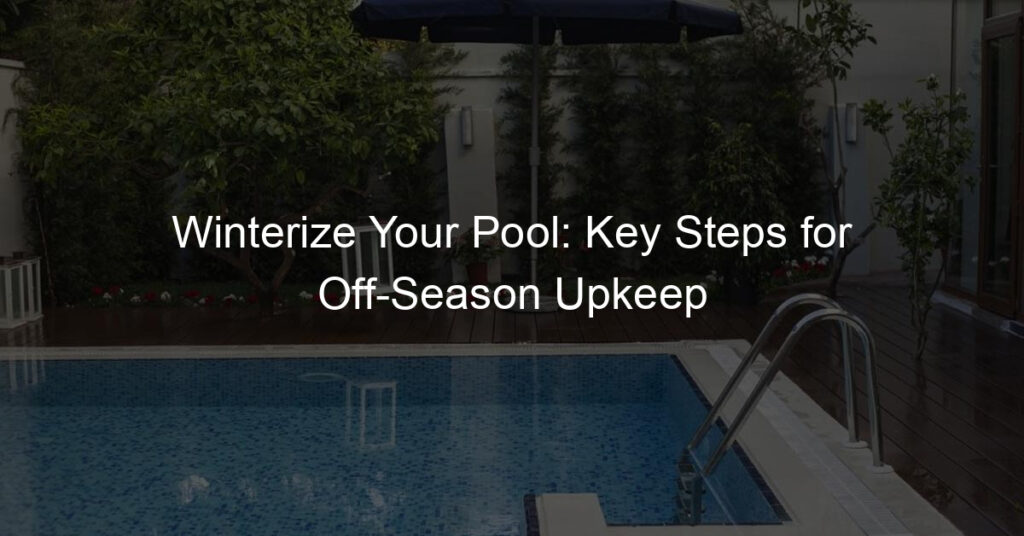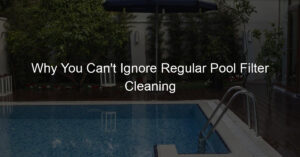Introduction to Winter Pool Maintenance
As temperatures drop and the leaves start to fall, pool owners might think it’s time to take a break from pool maintenance. However, taking care of your pool during the off-season is just as important as during the swimming season. This introduction to winter pool maintenance will guide you through the importance of off-season pool care and provide an overview of essential pool care steps during winter.
- Importance of Off-Season Pool Care
- Overview of Essential Pool Care Steps During Winter
Many pool owners underestimate the importance of off-season pool care. Neglecting your pool during the winter can lead to a variety of problems, including algae growth, water imbalance, and equipment damage. These issues can be costly and time-consuming to fix when the swimming season returns. By maintaining your pool during the off-season, you can ensure a smooth and hassle-free pool opening in the spring.
Winter pool maintenance involves several key steps. These include balancing the water chemistry, cleaning the pool, lowering the water level, protecting the pool equipment, and covering the pool. Each of these steps plays a crucial role in preserving the condition of your pool during the cold months. In the following sections, we will delve deeper into each of these steps, providing you with practical tips and advice to keep your pool in top shape throughout the winter.
Remember, winter pool maintenance is not just about protecting your investment, but also about ensuring that your pool is ready for you to enjoy as soon as the weather warms up. So, let’s dive in and learn how to properly care for your pool during the off-season.
Understanding Your Pool’s Needs in Winter
Winter is a season that brings about significant changes in the environment, and your pool is not exempted from these changes. It’s crucial to understand how winter affects your pool and what you can do to maintain it during this period. Let’s delve into the details.
How Winter Affects Your Pool
Winter can have a substantial impact on your pool in two major ways: it affects the pool water and the pool equipment. Let’s discuss each of these in detail.
- Effects of cold temperatures on pool water
- Impact of winter weather on pool equipment
When the temperature drops, the water in your pool can freeze. This doesn’t mean your pool will turn into a giant ice cube, but the surface of the water can freeze, especially if the temperature drops below freezing point. This can lead to several issues, such as an increase in the pool’s pH level, which can make the water cloudy and less safe for swimming. Additionally, frozen water expands, which can potentially damage the pool’s structure and lining.
Winter weather can also have a significant impact on your pool equipment. Cold temperatures can cause the components of your pool equipment to contract, which can lead to cracks and other damages. Snow and ice can also accumulate on your pool equipment, which can cause it to malfunction or even break down completely. Therefore, it’s important to regularly check and maintain your pool equipment during winter to prevent any major issues.
In conclusion, understanding your pool’s needs in winter is essential to ensure its longevity and usability. By being aware of the effects of winter on your pool water and equipment, you can take the necessary steps to protect and maintain your pool during the cold season.
Essential Winter Pool Care Tips
As the winter season approaches, it’s crucial to know how to take care of your pool properly. One of the key areas to focus on is adjusting your pool’s chemistry for the colder months. This involves testing and balancing the water chemistry and maintaining proper pH levels.
Adjusting Pool Chemistry for Winter
During winter, the chemistry of your pool water can change significantly. This is due to the lower temperatures and reduced sunlight. Therefore, it’s essential to adjust your pool’s chemistry to ensure it remains clean and safe to use.
- Testing and Balancing Water Chemistry
- Importance of Maintaining Proper pH Levels
Testing your pool’s water chemistry is the first step in adjusting it for winter. This involves checking the levels of chemicals like chlorine, bromine, and alkalinity. You can use a pool testing kit for this purpose. Once you’ve tested the water, you can then balance it by adding the necessary chemicals. Balancing your pool’s water chemistry is important because it helps prevent the growth of algae and bacteria, which can cause health problems.
Maintaining the proper pH levels in your pool is also crucial during winter. The pH level measures how acidic or basic your pool water is. A pH level between 7.2 and 7.8 is ideal for pools. If the pH level is too high or too low, it can cause problems like skin irritation and damage to your pool equipment. Therefore, you should regularly test the pH level of your pool and adjust it as necessary.
In conclusion, adjusting your pool’s chemistry for winter is an essential part of pool care. By testing and balancing your water chemistry and maintaining proper pH levels, you can ensure your pool remains clean and safe to use throughout the winter months.
Winter Pool Cleaning
As winter approaches, it’s essential to ensure your pool is clean and ready to handle the harsh weather conditions. Here are some steps and tips to help you with winter pool cleaning.
- Steps for Thorough Pool Cleaning Before Winter
- Remove Debris: Use a pool net to remove leaves, twigs, and other debris from the water surface.
- Brush and Vacuum: Brush the pool walls and floor to loosen any dirt or algae. Then, vacuum the pool to remove these particles.
- Filter Cleaning: Clean the pool filter to ensure it operates efficiently throughout the winter.
- Balance Water Chemistry: Test and balance the water chemistry. This includes pH, alkalinity, and sanitizer levels.
- Off-Season Pool Maintenance Cleaning Tips
- Regular Checks: Even if you’re not using the pool, check it regularly for any signs of damage or algae growth.
- Keep it Covered: Use a pool cover to keep debris out and reduce evaporation.
- Maintain Water Level: The water level should not go below the skimmer level. If it does, add more water.
- Monitor Water Chemistry: Even in winter, the water chemistry can change. Regularly test the water and adjust as necessary.
Before the cold weather sets in, it’s crucial to give your pool a thorough cleaning. Here are some steps to follow:
Even in the off-season, your pool requires some maintenance to stay in good shape. Here are some tips:
Remember, a clean pool before winter can save you a lot of trouble when spring comes. Follow these steps and tips to keep your pool in top shape during the off-season.
Protecting Your Pool Equipment in Winter
When winter arrives, it’s crucial to take steps to protect your pool equipment. This includes your pool pump and filter, which are vital components of your swimming pool system. Let’s delve into how you can winterize these pieces of equipment effectively.
Winterizing Pool Pump and Filter
Winterizing your pool pump and filter is a necessary step in ensuring their longevity and optimal performance. Here’s how you can do it:
- How to properly winterize your pool pump
- Steps for winter pool filter maintenance
The first step to winterizing your pool pump is to turn it off and disconnect it from the power source. Next, you should remove all the plugs and let the water drain out. Once it’s completely dry, store it in a dry, warm place to prevent any potential damage from freezing temperatures.
Winter pool filter maintenance involves cleaning the filter thoroughly before the onset of winter. Once cleaned, you should remove it from the system and store it in a dry, warm place. If your filter is a sand or D.E. filter, backwash it before storage. For cartridge filters, remove the cartridge and clean it with a hose before storing it away.
Remember, proper winterization of your pool pump and filter can save you from costly repairs or replacements in the future. It’s a small investment of time that can lead to a big payoff in terms of equipment longevity and pool health.
Protecting Pool Heater and Plumbing
When winter comes, it’s not just the pool water that needs attention. Your pool heater and plumbing also require special care to prevent damage from freezing temperatures. Here’s how to protect these crucial components of your pool system during the cold months.
-
Essential winter pool care for heaters
Your pool heater is a vital piece of equipment that needs to be properly maintained during winter. If left unprotected, it can freeze and break, leading to costly repairs. Here are some steps to protect your pool heater:
- Turn off the heater and let it cool down before winterizing.
- Drain all water from the heater to prevent freezing.
- Cover the heater with a waterproof cover to protect it from snow and ice.
- Check the heater regularly throughout the winter for any signs of damage.
By following these steps, you can ensure your pool heater is ready to warm your pool once winter is over.
-
Preventing plumbing damage during winter
Just like your pool heater, the plumbing system of your pool can also be damaged by freezing temperatures. Here’s how to prevent this from happening:
- Drain all water from the pipes to prevent freezing and bursting.
- Use pool antifreeze in the pipes if you live in an area with severe winters. Remember, this is not the same as car antifreeze and is safe for pools.
- Plug the return lines to keep water out of the pipes.
- Regularly check the plumbing for leaks or damage throughout the winter.
By taking these precautions, you can prevent costly damage to your pool’s plumbing system and ensure it’s ready for use in the warmer months.
Remember, winter pool maintenance is about more than just covering your pool and waiting for spring. By taking the time to properly care for your pool heater and plumbing, you can prevent damage, save money on repairs, and ensure your pool is ready to enjoy as soon as the weather warms up.
Using Pool Covers for Winter Pool Upkeep
When the winter season comes around, it’s important to take steps to protect your pool. One of the most effective ways to do this is by using a pool cover. In this section, we will discuss the benefits of using pool covers in winter and provide tips on how to choose the right one for your pool.
- Benefits of Using Pool Covers in Winter
- Protection from Debris: Pool covers prevent leaves, twigs, and other debris from falling into your pool. This reduces the amount of cleaning you’ll need to do when it’s time to open your pool again in the spring.
- Heat Retention: A pool cover acts as an insulator, trapping heat in the water. This can help to reduce energy costs if you choose to heat your pool during the winter.
- Water Conservation: By preventing evaporation, a pool cover can help to conserve water. This is not only good for the environment but can also save you money on your water bill.
- Safety: A sturdy pool cover can provide an added layer of safety, preventing accidental falls into the pool during the off-season.
- Choosing the Right Pool Cover for Winter
- Material: Pool covers are typically made from vinyl, mesh, or solid fabric. Each has its own advantages and disadvantages, so consider your specific needs and climate when making a decision.
- Size and Shape: Your pool cover should fit your pool perfectly. A cover that is too small won’t provide adequate protection, while one that is too large can be difficult to secure.
- Quality: Look for a pool cover that is durable and resistant to the elements. It may be tempting to go for a cheaper option, but investing in a high-quality cover can save you money in the long run by reducing maintenance costs and extending the life of your pool.
Pool covers offer a range of benefits during the winter months. Here are some key advantages:
When it comes to selecting a pool cover for winter, there are a few factors to consider:
In conclusion, using a pool cover in winter is a smart move for any pool owner. It not only protects your pool but can also save you time, money, and resources. Remember to consider the material, size, shape, and quality when choosing a pool cover to ensure you get the best fit for your needs.
Case Studies: Successful Winter Pool Maintenance
Let’s take a look at some real-life examples of how proper winter pool maintenance can lead to success. These case studies highlight the importance of taking the right steps to ensure your pool remains in good condition throughout the colder months.
-
Case Study 1: Effective Off-Season Pool Care
Consider the case of the Johnson family, who live in a region with harsh winters. They own a large outdoor pool that they use extensively during the summer. However, they used to struggle with pool maintenance during the off-season, often finding their pool water murky and equipment damaged by the time spring arrived.
They decided to change their approach and started implementing a comprehensive winter pool maintenance routine. This included regular water testing, using a winter pool cover, and taking steps to protect their pool equipment.
The results were remarkable. The following spring, their pool water was clear, and their equipment was in excellent condition. This case study shows the effectiveness of proper off-season pool care.
-
Case Study 2: Overcoming Winter Pool Maintenance Challenges
Next, let’s look at the Smith family. They live in a region with mild winters but still faced challenges in maintaining their pool. They often encountered issues like algae growth and water imbalance.
They decided to tackle these challenges head-on. They started by educating themselves about winter pool maintenance and then implemented a routine that included regular water testing, using algaecide, and maintaining the right water balance.
By the end of the winter, they had successfully overcome their pool maintenance challenges. Their pool was algae-free, and the water was perfectly balanced. This case study demonstrates that even in regions with mild winters, proper pool maintenance is crucial.
These case studies underline the importance of winter pool maintenance. By taking the right steps, you can ensure your pool remains in good condition throughout the off-season, ready for use when the warmer months arrive.
Conclusion: Key Takeaways for Winter Pool Maintenance
As we wrap up our comprehensive guide on winter pool maintenance, it’s crucial to remember the key points that we’ve discussed. These essential takeaways will ensure your pool remains in excellent condition throughout the winter months.
- Recap of essential winter pool care steps
Firstly, let’s revisit the essential winter pool care steps. These steps are the backbone of successful winter pool maintenance and should not be overlooked:
- Balance your pool’s chemistry: This includes pH, alkalinity, and calcium hardness levels.
- Lower the water level: This prevents damage from freezing water.
- Clean your pool: Remove any debris and clean the pool thoroughly.
- Winterize your pool equipment: This includes your pump, filter, and heater.
- Use a pool cover: This protects your pool from debris and freezing temperatures.
- Importance of regular pool maintenance during winter
Secondly, the importance of regular pool maintenance during winter cannot be overstated. Regular maintenance is the key to a healthy and functional pool. It helps to prevent damage from freezing temperatures, maintain water quality, and ensure your pool is ready for use when the warmer months roll around.
According to a case study, pools that are regularly maintained during winter require less time and money to prepare for the swimming season. This is because regular maintenance helps to prevent major issues that can be costly and time-consuming to fix.
In conclusion, winter pool maintenance is not a task to be taken lightly. By following the essential winter pool care steps and maintaining your pool regularly, you can ensure your pool remains in top condition throughout the winter months. Remember, a little effort now can save a lot of time and money in the future.














